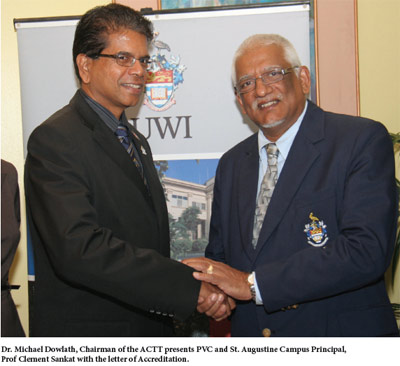 |
 |
 |
|
May 2011
|
St. Augustine gets accreditation
Members of the Campus administration, including Professor Rhoda Reddock, Deputy Principal; Mr. Jeremy Callaghan, Campus Registrar; and the Deans and Heads of the various faculties and departments, gathered at the Campus Principal’s Office to witness Dr. Michael Dowlath, Chairman of the ACTT, handing over the letter of accreditation to St. Augustine Campus Principal Professor Clement Sankat. Those attending the ceremony were informed that, not only has the Campus been accredited, but The UWI St. Augustine Campus was granted institutional accreditation for a period of seven years, the maximum length of time possible. “The evaluation team did find The UWI St. Augustine Campus to be a model university among similar types of universities which they had evaluated in the Caribbean, in Asia and in the UK and US,” said Mr. Michael Bradshaw, Ag. Executive Director of the ACTT. Two years ago, on Friday 15th May, 2009, The UWI St. Augustine Campus launched its accreditation candidacy with the ACTT. The Campus then embarked upon a rigorous process of self-examination and reflection driven by Mr. Jeremy Callaghan, who was also the Chair of the Self-Study Steering Committee; Dr. Sandra Gift, the Institutional Accreditation Coordinator; and Mrs. Deborah Souza-Okpofabri, the Campus’ Self-Study Coordinator. The findings were documented in the “UWI St. Augustine Campus’ Institutional Accreditation Self-Study Report, 2010” which was submitted to the ACTT. In February 2011, following the submission of this report, a team of evaluators appointed by the ACTT made a comprehensive site visit to the Campus. The results of this visit were documented in the “External Evaluator Report on the Application for Institutional Accreditation for The University of the West Indies – St. Augustine Campus.” This report highlights the strengths of the Campus as well as gives recommendations for needed transitions, critical to attaining and sustaining excellence in all areas of institutional life. Thus, “developing an action plan for realizing these transitions is a priority,” said Professor Sankat. At the end of the seven-year accreditation period, in 2018, the Campus will seek reaccreditation and in preparation, it will be expected to submit to a “focused site visit” in 2015. This visit will be carried out by another evaluation team appointed by the ACTT, and is aimed at supporting the Campus in further preparations for its reaccreditation exercise. The purpose of accreditation is to assure the public of the quality of an institution and its dedication to high standards, as well as its commitment to continuous improvement. |

 The St. Augustine Campus of The UWI was awarded institutional accreditation by the Accreditation Council of Trinidad and Tobago (ACTT) on Tuesday 3rd May, 2011.
The St. Augustine Campus of The UWI was awarded institutional accreditation by the Accreditation Council of Trinidad and Tobago (ACTT) on Tuesday 3rd May, 2011.